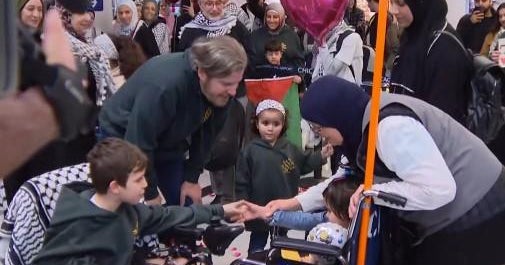With pro-Palestine encampment set up at Northwestern, some Jewish students worry about safety
EVANSTON, Ill. (CBS) -- While Northwestern University has joined other universities across the country in demonstrations calling for an end to partnerships with organizations that support Israel, others say the university is not doing enough to enforce its own rules – and to protect Jewish students.
A group of Northwestern students set up a tent encampment Thursday morning in Deering Meadow on the university's campus in Evanston. Protesters also posted a sign reading "Free Gaza Liberated Zone." Pro-Palestinian protesters at college campuses across the country have described similar encampments as "liberated zones."
Organizers of the Northwestern protest said they plan to occupy the area until Northwestern divests itself from companies that support Israel amid the ongoing war in Gaza, and vows to protect their free speech rights on campus.
University President Michael Schill sent a letter to students on Thursday morning, announcing an "interim addendum" to the Northwestern code of conduct, effective immediately, banning the installation of tents or other temporary structures on Northwestern property, except for school-approved events.
The protests at Northwestern gained momentum throughout the day Thursday. But along the edge of the property, some watched with concern.
Jewish students said they now worry about safety and security on campus.
While the protest at Northwestern has been largely peaceful, some students said they have seen a rise in anti-Semitism on campus since the Oct. 7, 2023, Hamas attacks on Israel. They now wonder if the protest now will have an exacerbating effect.
"You know there are people who don't go to Northwestern here. You don't have to scan to get on the lawn or anything," said senior Michael Braun. "It's a safety risk. So when you have a safety risk, and you don't know what interests these people have at heart, it's slightly unsettling."
Eden Macknin had at least one of her professors cancel class for the day, citing the protest. The professor said to students, "Take care of yourselves, and each other," according to Macknin.
Macknin spoke to CBS 2 across the fence from Deering Meadow where the protest encampment was set up. Drumming from the protest was near at the time.
"I'm really overwhelmed. Honestly, I—I'm at loss for words," she said. "I can't really help but stand here, and just look and listen, and observe what's going on."
Macknin said she is now worried about her safety.
"I feel unsafe on my own campus. I feel uncomfortable. I feel unwelcomed," said junior Eden Macknin, "and I don't think any university should allow students to feel that way."
The sounds of the protests also carried over to neighboring Northwestern Hillel—a Jewish student organization.
"We were not particularly surprised that would be happening here," said Northwestern Hillel executive director Michael Simon. "It was more of a question of when."
Simon said the university Hillel has heard from counterparts on other campuses about similar protests.
"What's really important, especially on a college campus, is that it is done in an environment that is free of intimidation, threats, or harassment," Simon said.
Jewish advocacy groups now watching what's happening in Evanston.
"The universities have codes of conduct," said David Goldenberg, Midwest Regional Director of the Anti-Defamation League. "They have standards that need to be enforced."
Northwestern Assistant Vice President for Communications Hilary Hurd Anyaso said in a statement, "Students who refuse to remove their tents will be subject to arrest and their tents will be removed by the University. Community members who do not adhere to University policies will face discipline."
Everyone who spoke with CBS 2 said they support the right to free speech and the students' ability to protest, but they have asked administrators to ensure that such protests are conducted without threats or harassment.



